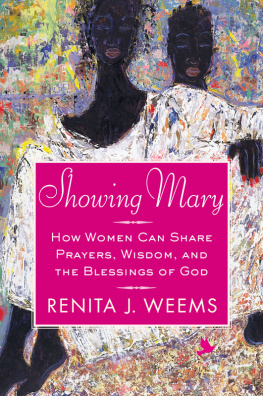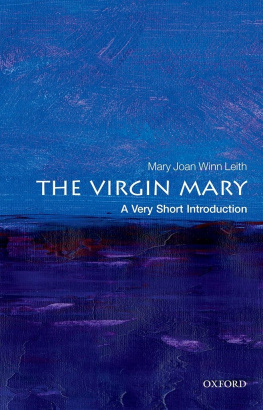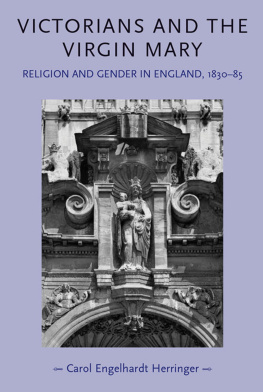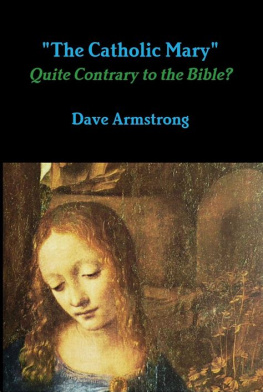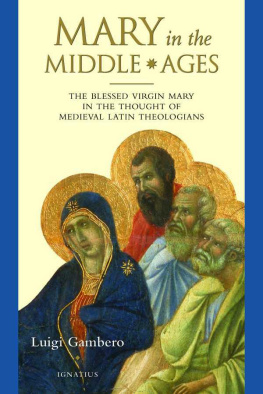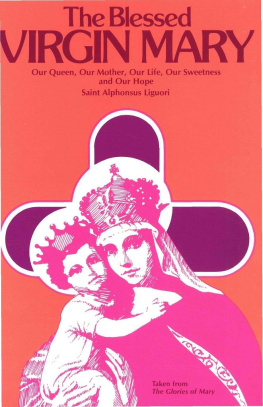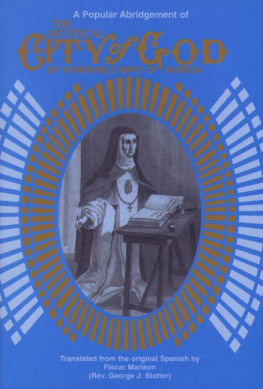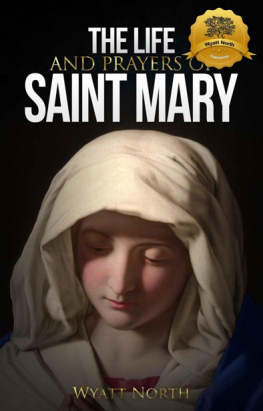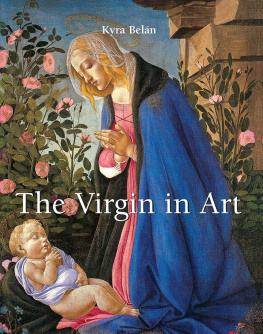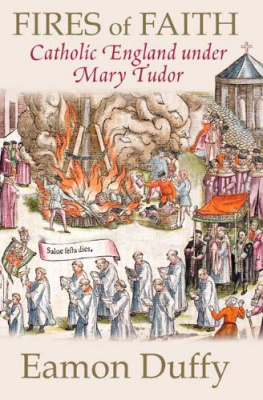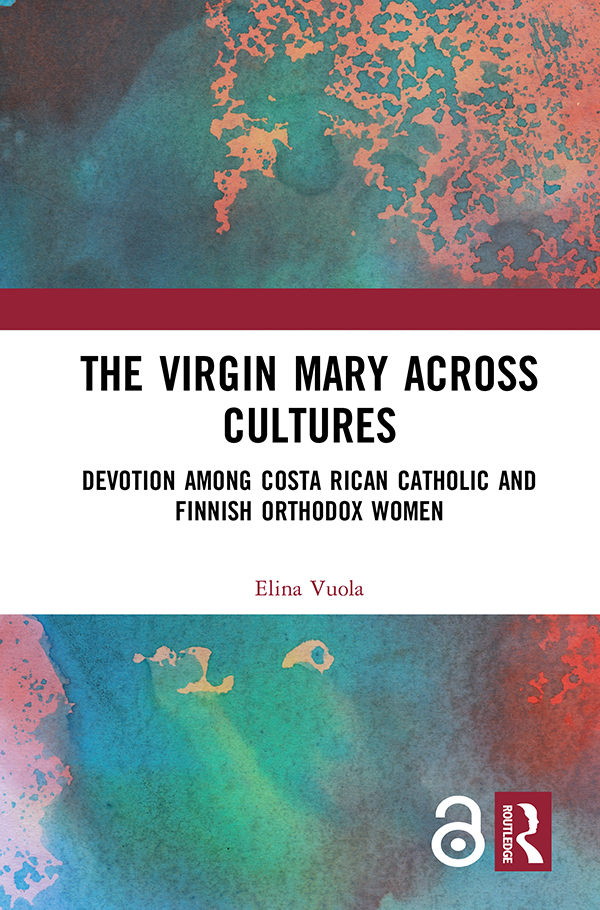Contents
Landmarks
The Virgin Mary across Cultures
This book examines womens relationship to the Virgin Mary in two different cultural and religious contexts, and compares how these relationships have been analyzed and explained on a theological and a sociological level. The figure of the Virgin Mary is a divisive one in our modern culture. To some, she appears to be a symbol of religious oppression, while to others, she is a constant comfort and even an inspiration towards empowerment.
Drawing on the authors own ethnographic research among Catholic Costa Rican women and Orthodox Finnish women, this study relates their experiences with Mary to the folklore and popular religion materials present in each culture. The book combines not only different social and religious frameworks but also takes a critical look at ways in which feminists have (mis)interpreted the meaning of Mary for women. It therefore combines theological and ethnographic methods in order to create a feminist Marian theology that is particularly attentive to womens lived religious practices and theological thinking.
This study provides a unique ethnographically informed insight into womens religious interactions with Mary. As such, it will be of great interest to those researching in religious studies and theology, gender studies, Latin American studies, anthropology of religion, and folklore studies.
Elina Vuola is Professor of Global Christianity and Dialogue of Religions at the Faculty of Theology, University of Helsinki, Finland. She has been a visiting scholar at the Chicago Theological Seminary, the Harvard Divinity School, and Northwestern University in the USA as well as the Departamento Ecumnico de Investigaciones in Costa Rica. Professor Vuola has published widely in this field in Finnish, Spanish, and English, contributing to publications such as Contemporary Encounters in Gender and Religion: European Perspectives, The Oxford Handbook of Feminist Theology, and The Oxford Handbook of the Virgin Mary.
The Virgin Mary across Cultures
Devotion among Costa Rican Catholic and Finnish Orthodox Women
Elina Vuola

First published 2019
by Routledge
2 Park Square, Milton Park, Abingdon, Oxon OX14 4RN
and by Routledge
52 Vanderbilt Avenue, New York, NY 10017
Routledge is an imprint of the Taylor & Francis Group, an informa business
2019 Elina Vuola
The right of Elina Vuola to be identified as author of this work has been asserted by her in accordance with sections 77 and 78 of the Copyright, Designs and Patents Act 1988.
All rights reserved. No part of this book may be reprinted or reproduced or utilised in any form or by any electronic, mechanical, or other means, now known or hereafter invented, including photocopying and recording, or in any information storage or retrieval system, without permission in writing from the publishers.
The Open Access version of this book, available at www.taylorfrancis.com, has been made available under a Creative Commons Attribution-Non Commercial-No Derivatives 4.0 license.
Trademark notice: Product or corporate names may be trademarks or registered trademarks, and are used only for identification and explanation without intent to infringe.
British Library Cataloguing-in-Publication Data
A catalogue record for this book is available from the British Library
Library of Congress Cataloging-in-Publication Data
Names: Vuola, Elina, author.
Title: The Virgin Mary across cultures: devotion among Costa Rican Catholic and Finnish Orthodox women / Elina Vuola.
Description: Abingdon, Oxon; New York, NY: Routledge, 2019. |
Includes bibliographical references and index.
Identifiers: LCCN 2019006185 (print) | LCCN 2019009677 (ebook) |
ISBN 9781315107530 (e-book) | ISBN 9781351607360 (PDF) |
ISBN 9781351607353 (ePub) | ISBN 9781351607346 (Mobi) |
ISBN 9781138092334 (hardback : alk. paper) |
ISBN 9781315107530 (ebk.)
Subjects: LCSH: Mary, Blessed Virgin, SaintDevotion toCosta
Rica. | Mary, Blessed Virgin, SaintDevotion toFinland. |
WomenReligious life. | Feminist theology.
Classification: LCC BT652.C8 (ebook) | LCC BT652.C8 V86 2019 (print) | DDC 232.91094897dc23
LC record available at https://lccn.loc.gov/2019006185
ISBN: 978-1-138-09233-4 (hbk)
ISBN: 978-1-315-10753-0 (ebk)
Typeset in Sabon
by codeMantra
For my mother
Note: The people in the pictures throughout the book are not those interviewed.
Is the Virgin Mary, the quintessential woman of Christianity and Western culture, a harmful and oppressive figure for women, as many feminists claim? Or is she as the crystallization of everything considered feminine in both Western and Christian theology the only existing female reflection of the divine in which even contemporary women can see themselves reflected? Why is it that so many women all over the world, in different cultural and religious contexts, and at different times, consider her worthy of their love and devotion, and even claim that she is an important source of consolation and empowerment for them?
These questions have interested me throughout my career. Much of my research has if not focused on the Virgin Mary at least had her as an important thread in it starting with my MTh thesis on feminist theology in the mid-eighties. In my 1997 doctoral dissertation on the interaction between Latin American liberation theology and feminist theology, I have an entire chapter on the Latin American Mary. At some point, I felt a need to go beyond mere theological and textual analysis, and listen to the voices of ordinary women, culminating in two sets of interviews: with Costa Rican Catholic women in 2006 and 2007, and with Finnish Orthodox women in 2013 and 2014. This book brings together all this work, with a broad intention to argue for the existence of womens cross-cultural Marian piety. At its root, it responds in the affirmative to my second question: that believing Christian women in very different contexts tell the same story of a Mary who is both like them and unlike them and is therefore both a point of deep identification and a source of help and empowerment.
This project started as an English translation of my book on the Virgin Mary in Finnish (Jumalainen nainen. Neitsyt Mariaa etsimss. Helsinki: Otava, 2010). Professor Kirsi Stjerna, of Finnish origin, kindly translated parts of the book into English, some of which is used in this book (especially is thus new material in its entirety.
A unique combination of factors makes my book different from other books on Mary. First, my critical discussion with feminist (both secular and theological) critique of the Mary symbol; second, my extensive knowledge of Latin American theology and my own ethnographic research in Costa Rica; and third, my placing these in dialogue with the Finnish-Karelian oral folk tradition in which Mary is a central figure and my original ethnographic research with Orthodox women in Finland. Fourth, I am a systematic theologian who has used ethnographic methods. Too often, either theological considerations or lived experiences are lacking since theologians are not usually ethnographers, and anthropologists do not work with doctrines. Finally, the book is a concrete example of my more theoretical critique of gender studies and feminist scholars, which often fail to understand or deal with religion adequately.


